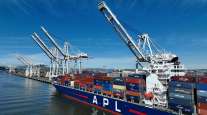Port of Los Angeles to Delay Driver Ban
This story appears in the Sept. 6 print edition of Transport Topics.
The Port of Los Angeles said it would delay enforcement of a ban on independent drayage operators despite a federal judge’s ruling upholding the legality of that ban as part of the port’s controversial clean-trucks plan.
Geraldine Knatz, the port’s executive director, said in a memo to harbor commissioners last week that a decision by U.S. District Judge Christina Snyder of Los Angeles was a “great victory” for the port but that she would seek guidance from commissioners at their Oct. 7 meeting before moving ahead with implementation of the port’s employee-only concession plan.
In an Aug. 26 decision in a two-year-old lawsuit filed by American Trucking Associations, Snyder determined that the concession program is legal because the port acted as a “market participant” out of business necessity and therefore is exempt from the law that gives only the federal government the authority to regulate interstate trucking. ATA said it would appeal the ruling.
Although Snyder ruled that several provisions contained in the Port of Los Angeles concession agreements challenged by ATA fall under federal preemption, she nonetheless said that the entire clean-trucks plan was legal because the port did not act in a regulatory role when it adopted the diesel emissions reduction plan.
The Federal Aviation Authorization Act of 1994 gives the federal government the authority to regulate interstate trucking and does not allow states or local governments to implement regulations that interfere with the motor carriers’ “prices, routes or services.”
But Snyder said the market-participant doctrine “distinguishes between the role of the state or local government as a regulator and its role as a market participant. Therefore, if state action is proprietary, rather than regulatory, such action is not generally subject to statutory preemption,” the judge wrote.
Snyder’s ruling, expected to be made final in the next few weeks, means the port technically can implement all the provisions of its wide-ranging clean-trucks plan, including its requirements for employee drivers, truck maintenance, off-street parking, financial capability and placards.
Robert Digges Jr., an ATA vice president and its chief counsel, called Snyder’s decision “misguided” and said ATA would appeal the ruling to 9th U.S. Circuit Court of Appeals and also would ask Snyder to stay her decision until all the legal issues are resolved by the appellate court.
“We’re disappointed but not terribly surprised, given the way the district judge had ruled in the past,” Digges told Transport Topics last week. “But we’re very confident on appeal that it’s a total misapplication of the market-participant doctrine.”
In court documents, ATA has said the market-participant exception did not apply because the port did not procure drayage services, did not operate port terminals, did not negotiate contracts to dray cargo to or from the port and did not engage in marketing to attract motor carriers to the port.
But Snyder said in her ruling that the port’s clean-trucks plan was implemented to “sustain and promote” port operations. The port is a “self-sustaining landlord and operator of a commercial enterprise that competes with other West Coast and North American ports,” she wrote.
Snyder said the port presented evidence that convinced her that, without its diesel emissions reduction plan, it could not continue to grow. Several terminal expansion projects have been delayed because of environmental regulations, community concerns and litigation from environmental groups, Snyder noted.
She conceded, however, that the employee-only driver provision was designed “to transfer the financial burden of administration and record-keeping onto the trucking companies instead of the port.”
“This is clearly an economically motivated action, and one that a private company with substantial market power — such as the oligopoly power of the port — would take when possible in pursuit of maximizing profit,” Snyder wrote.
ATA’s Digges and Curtis Whalen, executive director of ATA’s Intermodal Motor Carriers Conference, said they believe the appeals court will overturn Snyder’s ruling.
Whalen said that Snyder — twice in past written court rulings on the ATA lawsuit and once during a summary judgment hearing — said that the market-participant doctrine did not likely meet either of the two legal tests for exemption.
The 9th Circuit judges also addressed the issue in their highly critical 2009 reversal of Snyder’s decision denying ATA’s initial request for a temporary injunction. The appellate judges said they “agree with the district court that it is likely that ATA will prevail” on the market participant exception issue.
Through spokesmen, Los Angeles and Long Beach port officials declined comment on the details of Snyder’s decision or how it might affect future port operations. However, Los Angeles Mayor Antonio Villaraigosa (D) said in a statement that the decision is “evidence that we are making real progress on growing and greening our port.”
Melissa Lin Perrella, a senior staff attorney with the Natural Resources Defense Council, which backed the port in the lawsuit, called Snyder’s nearly 60-page ruling “methodical” and “a very careful analysis.”
“I am extremely hopeful and confident that the 9th Circuit will look favorably on her reasoned approach and affirm it,” Perrella told TT.




